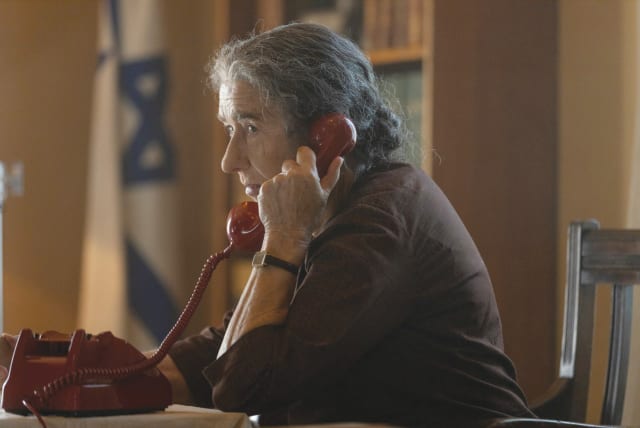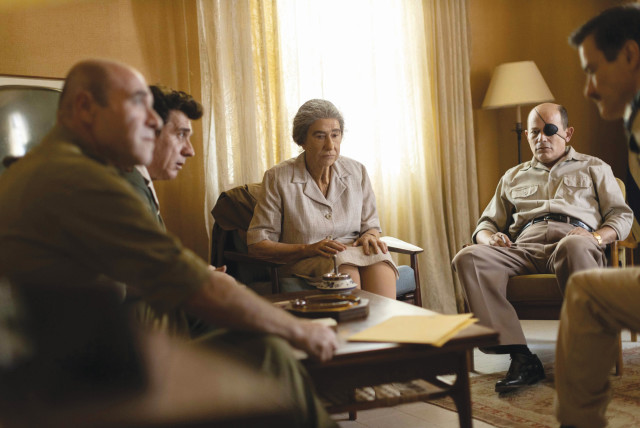‘Golda’: Helen Mirren triumphs as Israel’s late prime minister - review

Helen Mirren delivers an Oscar-worthy performance as Israeli prime minister Golda Meir and is unrecognizable as the barrier-shattering politician.
In Guy Nattiv’s Golda, opening throughout Israel and the US on August 24, Helen Mirren gives an extraordinary performance as the late Israeli prime minister, in a story that focuses on her handling of the 1973 Yom Kippur War, the most challenging crisis of her political career.
She makes Golda vivid through a haze of cigarette smoke, as the real-life Meir was a heavy smoker, as were most of the IDF brass. Mirren spends the movie with a cigarette in hand, even in scenes when she is at Hadassah-University Medical Center, receiving treatment for lymphoma. The movie is coming out, fittingly, just weeks before the 50th anniversary of the war.
If you didn’t know it was Mirren in the title role, you would never guess that it is the slim British actress under all the makeup and prosthetics. She has been suitably de-glamorized so that she can pass as the down-to-earth politician who broke barriers as she led Israel in the 1960s and ’70s.
Mirren speaks English throughout the movie, which makes more sense than it normally does in such historical dramas, since Meir grew up in the US. Mirren approximates Meir’s English speech quite brilliantly (Meir has a bit of a Midwestern accent, having spent most of her years in Milwaukee) although the Oscar-winning actress, who played another iconic female leader in The Queen, gives a fully formed performance, not an impersonation. Mirren certainly deserves another Oscar nomination for this touching performance.
Meir’s controversial handling of the war, specifically the debate between Meir and her staff about how much Israel should mobilize, is at the heart of the movie. The screenplay by Nicholas Martin, a writer with no Israeli background, does a remarkable job at piecing together a complex story.
Piecing together the complex story of Golda Meir and the Yom Kippur War

The movie’s framing device is Meir’s testimony to the Agranat Commission following the war, which was formed to evaluate whether Meir, defense minister Moshe Dayan (Rami Heuberger), and other military personnel should be censured. The facts behind why Israel was not prepared for the outbreak of the Yom Kippur War, in which Israeli troops were greatly outnumbered at the outset, are complicated.
Essentially, Dayan played down reports that an attack was imminent, while chief of staff David “Dado” Elazar (Lior Ashkenazi) favored mobilization. Eventually, Meir was swayed to Elazar’s side, but only a few hours before the attack. As the movie shows, Meir – in sharp contrast to today’s political leaders – took responsibility for her handling of the war in its aftermath.
Much of the movie shows Meir following the progress of the war and working with Dayan, Elazar, and various generals in the command center. Ariel Sharon (Ohad Knoller), portrayed as a grandstanding careerist, makes a brief appearance. It’s an effective decision not to show the battlefields, and instead to have Meir reacting to real-time communications from the fighting. It’s truly harrowing to realize how she had to make key decisions with limited information.
Another effective touch is showing her compassion for one of the secretaries whose son is fighting in a spot where many were killed. The portrayal of Meir’s conduct during the war emphasizes the contradictory sides of her personality: the frumpy maternal woman who grieves for every soldier who falls on the battlefield – she records all losses daily in a notebook she carries – and the tough-as-nails commander.
ONCE MIRREN was cast, it was a given that the movie had to be in English, and the cast mixes such Israeli actors as Heuberger, Askhenazi, and Knoller with foreigners, among them Camille Cottin of Call My Agent!, who plays Meir’s personal assistant Lou Kaddar, and Ed Stoppard (playwright Tom Stoppard’s son) as Israeli Air Force Commander Benny Peled.
It seems strange that the battlefield conversations are in Hebrew, which is jarring and points up the artificiality of the fact that all the characters are speaking English. However, these battlefield communications are powerful and the mix of languages likely will not seem so incongruous outside Israel.
But it’s probably not a coincidence that some of the most powerful scenes in the movie feature Golda speaking to Henry Kissinger, played quite convincingly by Liev Schreiber, recreating conversations that did take place in English.
In one, she says that she will not allow humanitarian aid to be brought to trapped Egyptian troops until Egyptian president Anwar Sadat agrees to recognize Israel by name and to stop calling it “the Zionist entity,” which, the movie suggests, paved the way for the Camp David Peace Treaty a few years later.
In another, she recalls hiding with her family in Ukraine to avoid pogroms, an anecdote that seems to resonate with Kissinger. The movie also includes one of Meir’s most famous quotes, which was part of a conversation with Kissinger, when he said, “Golda, you must remember that first I am an American, second I am Secretary of State, and third I am a Jew,” to which she responded, ‘’Henry, you forget that in Israel we read from right to left.’’
The story of Meir’s illness, which was carefully hidden from the public – these were very different times – and the scenes of her struggling with the disease give a layer of vulnerability to her character that humanizes her, and makes her toughness all the more impressive.
There were certain poetic touches in the movie, mostly involving a flock of birds, which struck me as heavy-handed when I first saw Golda at the Berlin International Film Festival earlier this year. But when I saw the movie again at the opening of the Jerusalem Film Festival, I felt that they worked better.
Golda is likely to be the only movie most English-speaking audiences ever see about the Yom Kippur War. Given that, a certain amount of expository dialogue is needed to give background on the war. Israelis may find these sections overly obvious, but they give the movie context for international moviegoers.
For many Israelis, the Yom Kippur War marked the first time that their trust in the government was broken, and Meir was the focus of much anger, as the scenes at the Agranat Commission make clear. But no matter how you feel about Meir, and her role in the war, it’s undeniable that she was one of the most important and fascinating women of the 20th century. Mirren’s brilliant performance, and the entire movie, is a fitting and compelling tribute to her.
Jerusalem Post Store
`; document.getElementById("linkPremium").innerHTML = cont; var divWithLink = document.getElementById("premium-link"); if (divWithLink !== null && divWithLink !== 'undefined') { divWithLink.style.border = "solid 1px #cb0f3e"; divWithLink.style.textAlign = "center"; divWithLink.style.marginBottom = "15px"; divWithLink.style.marginTop = "15px"; divWithLink.style.width = "100%"; divWithLink.style.backgroundColor = "#122952"; divWithLink.style.color = "#ffffff"; divWithLink.style.lineHeight = "1.5"; } } (function (v, i) { });
